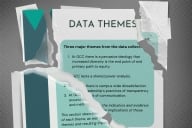You have /5 articles left.
Sign up for a free account or log in.
SAN FRANCISCO – Community college leaders haven’t exactly jumped on the “disruption” bandwagon. That may be understandable given the popular narrative that digital innovation will replace faculty members and even entire colleges. But the two-year sector’s wariness seems to be fading, if the annual convention of the American Association of Community Colleges is any indication.
The conference, which began in this tech-friendly city over the weekend, featured many sessions on how budget-strapped colleges can use self-paced online courses and free digital content, such as massive open online courses, to boost efficiency and serve more students.
Helping to set the tone was Salman Khan, founder of the Khan Academy, who gave the opening keynote speech on Saturday. About six million people around the world watch Khan’s free online tutorials each month.
Khan thinks his nonprofit website can help community colleges, which he said are in the academy’s “sweet spot.” And he views community colleges as potential allies rather than competition.
“We’d love to work with any of you,” said Khan, apparently broaching the suggestion for the first time.
The two-year sector is open to that idea, said Walter G. Bumphus, the association’s president. Bumphus later told the meeting’s attendees that he and fellow leaders of the association talked with Khan backstage about possible collaborations, and discussed setting up a committee to consider how to use the academy’s material.
“It’s going to be good for community colleges and good for AACC,” Bumphus said.
Khan’s presentation made the case for competency-based learning that is self-paced and backed by data analytics. That approach has gained plenty of support of late. But so far, relatively few community colleges have tried it.
For many students, a sticking point in moving forward in their studies may be a single concept, Khan said. Unlike traditional lectures, his online tutorials can be watched many times – 30 times for some students, who are then able keep pace with or even surpass their peers.
The Khan Academy shouldn’t replace brick-and-mortar classrooms at community colleges, Khan said. But two-year colleges could use free online material to help students, perhaps those with remedial needs, he said. Remedial courses are a black hole in American higher education, from which relatively few students emerge.
“If we let students work at their own pace,” he said, “big jumps” in achievement are possible.
Homegrown Open Source
Some community colleges have created their own open-source content that is geared to remedial courses.
Bossier Parish Community College, for example, this year began offering free, online study guides to its students. The coursework is tied to developmental grammar, and is broken into discrete concepts, said Allison Martin, director of institutional effectiveness initiatives at the college, during a session here.
For example, the web-based material includes tabs for major concepts, like subject-verb agreement. That way students can skip what they know and focus on what they need to learn, retaking quizzes many times if necessary.
“They don’t want to have to track all the way through some tutorial to find their weakness,” said Martin.
The Louisiana college's goal is for students to use the guides to prepare for placement tests or in “tandem with their for-credit courses” in remedial tracks. The material’s creation costs were manageable, Martin said. And she predicted they will be recouped in savings through improved student retention rates.
Bossier Parrish enrolls about 8,000 students. But it’s growing fast, and is projected to enroll 10,000 next year. That’s part of why the college has turned to online learning, said Martin.
“We don’t have any classroom space,” she said.
MOOC as Study Guide
Wake Tech Community College is among several two-year institutions that have begun using massive open online courses (MOOCs) to help meet student demand in remedial tracks.
“We thought this could be a next generation open door,” said Bryan Ryan, senior vice president of curriculum education services at Wake Tech, during a panel discussion.
Last year the college, which is located in North Carolina, received a grant from the Bill and Melinda Gates Foundation to create a MOOC in remedial math. The funding was part of a group of grants to study the potential for MOOCs as remedial or introductory courses.
Wake Tech partnered with Udacity, one of the major MOOC providers, on the project. Instructors from the college designed the content, but Udacity staff members delivered it, said Laura Kalbaugh, Wake Tech’s dean of academic success and transition resources. She praised the company’s platform, which she said is engaging and interactive for faculty members.
The coursework is designed to be a study supplement for Wake Tech students who place into remedial math. The final product goes live next month.
“This MOOC is not going to be a replacement for any of our classes,” Kalbaugh said. “It’s going to be a brush up.”
Technology, however, did not cooperate during the session. A Web browser loaded slowly on a projected computer display, and presenters were not able to play examples of the video tutorials.
Self-Paced for Credit
Self-paced courses can also be credit bearing, according to a panel hosted by Ivy Tech Community College, which is Indiana’s statewide system.
The system last year began working with Pearson, the education technology company, to find “alternative pathways to credit,” said Kara Monroe, associate vice president for academic online programs at Ivy Tech.
The Khan Academy, along with other popular websites like YouTube and Wikipedia, offer opportunities for people to learn at their own pace, said Catrina Poe, an assistant vice president at Pearson Learning Solutions. But that learning doesn’t come with college credit.
Pearson has tried to change that with its Propero portal, which now includes 44 general education and introductory courses that are online and self-paced. The material is automated. Courses cost a flat fee of $299, which includes access to an e-textbook and online tutoring from Pearson.
If students successfully complete the course assessments, they can earn credit recommendations from the American Council on Education. Many colleges -- but not all -- issue credit based on those recommendations.
The courses take an average of about 12 weeks to finish. But students can work faster, or slower.
Ivy Tech was one of Propero’s first partners. The colleges in the system issue credits for the courses based on challenge exams, which students take to demonstrate their mastery of required learning in a course equivalent. Ivy Tech students can take College Level Examination Program (CLEP) exams to earn credit for four Propero courses. The college suggests those courses as an option for some students.
“It’s not for everybody,” Poe said. “It’s for some of your students.”








